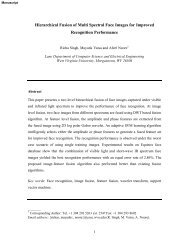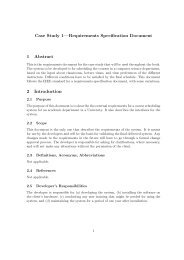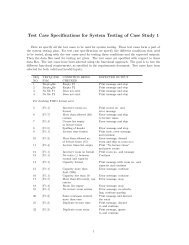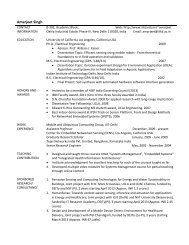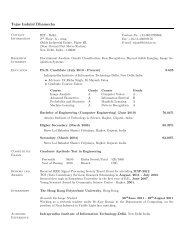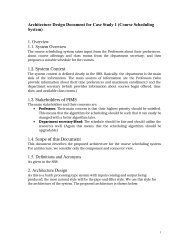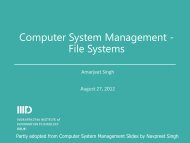Comparison of Seven Bug Report Types: A Case-Study of ... - IIIT
Comparison of Seven Bug Report Types: A Case-Study of ... - IIIT
Comparison of Seven Bug Report Types: A Case-Study of ... - IIIT
Create successful ePaper yourself
Turn your PDF publications into a flip-book with our unique Google optimized e-Paper software.
TABLE ICLOSELY RELATED WORK LISTED IN A CHRONOLOGICAL ORDER<strong>Bug</strong> Type <strong>Study</strong> Dataset <strong>Study</strong> Objectives1 Usability Twidale and Mozilla and GNOMENichols (2005)[5]2 Security Gegick et al.(2010) [3]3 Performance, SecurityZaman et al.(2011) [4]4 Crash Khomh et al.(2011) [6]5 Performance Zaman et al.(2012) [7]Cisco S<strong>of</strong>tware SystemFirefox ProjectFirefox ProjectMozilla Firefox and Google ChromeUsability bug report analysis to characterize howdevelopers address and resolve issuesAutomatic identification (statistical modeling) <strong>of</strong> securitybugs based on natural language informationpresent in bug reports<strong>Comparison</strong> between Security and Performance bugson various aspectsTriaging <strong>of</strong> crash-types based on entropy regiongraphA qualitative study on performance bugs across fourdimensions (Impact, Context, Fix and Fix validation)TABLE IIGOOGLE CHROME BROWSER EXPERIMENTAL DATASET DETAILSField Value Field ValueFirst Issue ID 2 CRASH <strong>Bug</strong> <strong>Report</strong>s 3778Last Issue ID 111889 REGRESSION <strong>Bug</strong> <strong>Report</strong>s 2938<strong>Report</strong>ing Date <strong>of</strong> First Issue Id 30-08-2008 SECURITY <strong>Bug</strong> <strong>Report</strong>s 398<strong>Report</strong>ing Date <strong>of</strong> Last Issue Id 29-01-2012 CLEAN <strong>Bug</strong> <strong>Report</strong>s 800Issues Downloaded 93951 POLISH <strong>Bug</strong> <strong>Report</strong>s 261Issues [state=closed and status=fixed ,verified, duplicate] 53110 PERFORMANCE <strong>Bug</strong> <strong>Report</strong>s 169Issues unable to download 17938 USABILITY <strong>Bug</strong> <strong>Report</strong>s 38differences between commercial and open-source projects andthe pattern <strong>of</strong> discourse emerging across projects [5].Gegick et al. [3] present a technique to automaticallyidentify security bugs by text-mining the natural languageinformation present in a bug report. Their research shows thatsecurity bugs are <strong>of</strong>ten mislabeled as non-security due to lack<strong>of</strong> security domain knowledge. They derive a statistical modelfrom a labeled training dataset and then apply the inducedmodel on test dataset. Their solution approach was able toidentify a high percentage <strong>of</strong> security bugs which were labeledas non-security [3].Khomh et al. [6] present a method for triaging crash-typesbased on the concept <strong>of</strong> entropy region graph and introduce atechnique that in addition to the frequency counts also capturesthe distribution <strong>of</strong> the occurrences <strong>of</strong> crash-types among theusers <strong>of</strong> a system.Zaman et al. [4] perform an empirical analysis <strong>of</strong> securityand performance bugs (non-functional bug types) from Firefoxopen-source project and compare various aspects associatedwith the two types <strong>of</strong> bugs. The study by Zaman et al [4].reveals insights on aspects like: how <strong>of</strong>ten the two types <strong>of</strong>bugs are tossed and reopened, triage time, characteristics <strong>of</strong>bug fixes, number <strong>of</strong> developers involved and number <strong>of</strong> filesimpacted.Zaman et al. [7] investigate performance bug reports <strong>of</strong>Mozilla Firefox and Google Chrome across four dimensions(Impact, Context, Fix and Fix validation) and study severalcharacteristics <strong>of</strong> performance bugs and make recommendationson how to improve the process <strong>of</strong> identifying, trackingand fixing performance bugs.In context to existing literature and closely related work, thispaper makes the following unique and novel contributions.1) A first empirical study comparing seven different types<strong>of</strong> bug reports (cleanup, crash, polish, performance,regression, security and usability) on a popular opensourceproject (Google Chromium Browser) across multipledimensions (MTTR, priority, frequently occurringterms, bug fixing process quality, continuity and efficiencyperformance characteristics, component and reporterentropy, number <strong>of</strong> stars, comments, descriptionlength and milestone changes).2) The results and insights presented in this paper answersseveral research questions such as the degree <strong>of</strong> differencebetween metrics such as mean time to repair,priority and mile-stone changes across seven differenttypes <strong>of</strong> bug reports. The study provides evidences<strong>of</strong> correlation between certain terms and bug reporttypes. Empirical results demonstrating similarities anddifference in bug fixing process quality, continuity andefficiency across different bug reports are presented.III. EXPERIMENTAL DATASETWe conduct experiments on publicly-available data fromopen-source projects so that our experiments can be replicatedand our results can be used for benchmarking or comparison.Google Chromium is a popular and widely used opensource browser 4 and Google Chromium bug database hasalso been used for mining s<strong>of</strong>tware repositories experiments 5by researchers. We download bug report data from GoogleChromium issue tracker 6 using the issue tracker Java APIs 7 .4 http://www.chromium.org5 http://2011.msrconf.org/msr-challenge.html6 http://code.google.com/p/chromium/issues/list7 http://code.google.com/p/support/wiki/IssueTrackerAPI518



